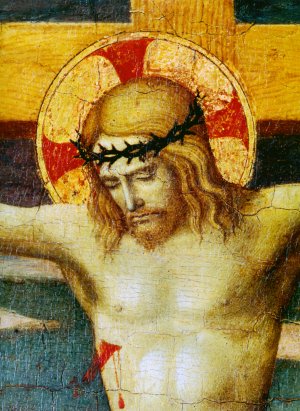Abiding by the Open Side of Christ
 Reflection #2
Reflection #2
This divine activity now takes on dramatic form when, in Jesus Christ, it is God Himself who goes in search of the “stray sheep,” a suffering and lost humanity. When Jesus speaks in his parables of the shepherd who goes after the lost sheep, of the woman who looks for the lost coin, of the father who goes to meet and embrace his prodigal son, these are no mere words: they constitute an explanation of his very being and activity.
His death on the Cross is love in its most radical form. By contemplating the pierced side of Christ (cf. Jn19:37), we can understand the starting-point of this Encyclical Letter: “God is love” (1 Jn 4:8). It is there that this truth can be contemplated. It is from there that our definition of love must begin. In this contemplation the Christian discovers the path along which his life and love must move.
Jesus gave this act of oblation an enduring presence through his institution of the Eucharist at the Last Supper. He anticipated his death and Resurrection by giving his disciples, in the bread and wine, his very self, his body and blood as the new manna (cf. Jn 6:31-33). The ancient world had dimly perceived that man’s real food—what truly nourishes him as man—is ultimately the Logos, eternal wisdom: this same Logos now truly becomes food for us—as love.
The Eucharist draws us into Jesus’ act of self-oblation. More than just statically receiving the incarnate Logos, we enter into the very dynamic of his self-giving. The imagery of marriage between God and Israel is now realized in a way previously inconceivable: it had meant standing in God’s presence, but now it becomes union with God through sharing in Jesus’ self-gift, sharing in his body and blood. The sacramental “mysticism”, grounded in God’s condescension towards us, operates at a radically different level and lifts us to far greater heights than anything that any human mystical elevation could ever accomplish.---------- Deus Caritas Est
Where can the weak find a place of firm security and peace, except in the wounds of the Savior? Indeed, the more secure is my place there the more he can do to help me. The world rages, the flesh is heavy, and the devil lays his snares; but I do not fall, for my feet are planted on firm rock. I may have sinned gravely. My conscience would be distressed, but it would not be in turmoil, for I would recall the wounds of the Lord: He was wounded for our iniquities. What sin is there so deadly that it cannot be pardoned by the death of Christ? And so if I bear in mind this strong, effective remedy, I can never again be terrified by the malignancy of sin.
Surely the man who said: “My sin is too great to merit pardon,” was wrong. He was speaking as though he were not a member of Christ and had no share in his merits, so that he could claim them as his own, as a member of the body can claim what belongs to the head. As for me, what can I appropriate that I lack from the heart of the Lord who abounds in mercy? They pierced his hands and feet and opened his side with a spear. Through the openings of these wounds I may drink honey from the rock and oil from the hardest stone: that is, I may taste and see that the Lord is sweet.
He was thinking thoughts of peace, and I did not know it, for who knows the mind of the Lord, or who has been his counselor? But the piercing nail has become a key to unlock the door, that I may see the good will of the Lord. And what can I see as I look through the hole? Both the nail and the wound cry out that God was in Christ reconciling the world to himself. The sword pierced his soul and came close to his heart, so that he might be able to feel compassion for me in my weaknesses.
Through these sacred wounds we can see the secret of his heart, the great mystery of love, the sincerity of his mercy with which he visited us from on high. Where have your love, your mercy, your compassion shone out more luminously than in your wounds, sweet, gentle Lord of mercy? More mercy than this no one has than that he lay down his life for those who are doomed to death. My merit comes from his mercy; for I do not lack merit so long as he does not lack pity. And if the Lord’s mercies are many, then I am rich in merits. For even if I am aware of many sins, what does it matter? Where sin abounded grace has overflowed. And if the Lord’s mercies are from all ages forever, I too will sing of the mercies of the Lord forever. Will I not sing of my own righteousness? No, Lord, I shall be mindful only of your justice. Yet that too is my own; for God has made you my righteousness.
“It is true that the creature loves less because she is less. But if she loves with her whole being, nothing is lacking where everything is given” --- St. Bernard of Clairvaux, The Sacred Wounds of Christ (Sermon 1130 AD)
 Reflections written by Deacon James Keating
Reflections written by Deacon James Keating